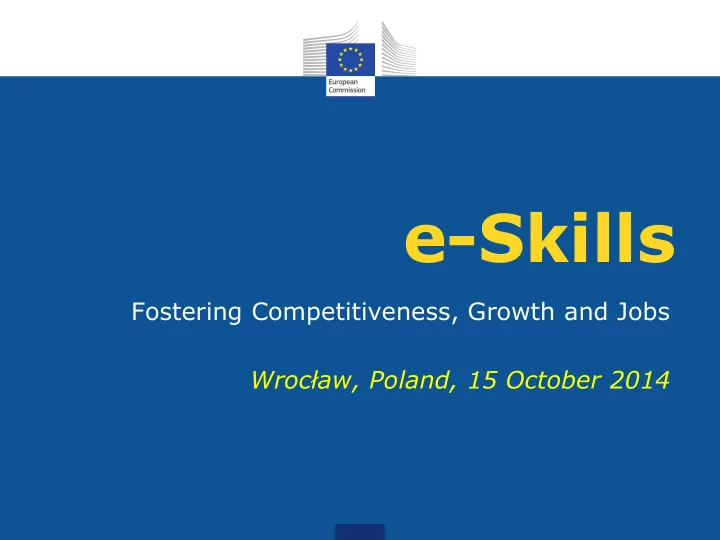

e-Skills Fostering Competitiveness, Growth and Jobs Wrocław, Poland, 15 October 2014
The e-Skills Pyramid e-Leadership skills ): these correspond to the capabilities needed to exploit opportunities provided by ICT, notably the Internet; to ensure more efficient and effective performance of different types of organisations; to explore possibilities for new ways of conducting business/administrative and organisational processes; and/or to establish new businesses. e-Leaders ICT practitioner skills : these are the capabilities required for researching, developing, designing, strategic planning, managing, producing, consulting, marketing, selling, integrating, installing, administering, maintaining, supporting ICT practitioners and servicing ICT systems. ICT user skills: these represent the capabilities required for the effective application of ICT systems and devices by the individual. ICT users apply systems as tools in support of their own work. User ICT users skills cover the use of common software tools and of specialised tools supporting business functions within industry. At the general level, they cover "digital literacy". digital literacy
ICT Workforce Growth in Europe
EU28 2013 - Total: 7325000 Other ICT practitioners - associate/ technician level 1,045,000 Management,architecture and analysis 1,765,000 European Core ICT practitioners - Union (EU28) associate/ technician level 1,289,000 Other ICT practioners - professional level 618,000 Core ICT practioners - professional level 2,608,000
Changes in External IT Spending among European Organisations, 2014
IT Priorities among European Organisations
The Three Scenarios (2012-2020) 1600000 Disruptive Boost 1400000 1,346,000 1200000 Main Forecast 1000000 Scenario 913,000 800000 730,000 558,000 600000 Stagnation 509,000 400000 449,000 274,000 200000 0 2012 2013 2014 2015 2016 2017 2018 2019 2020
ICT Workforce Expected Growth (2011/2020) 44.159% Management, business 15.529% architecture and analysis 8.452% 9.511% ICT practitioners & 5.837% technicians 1.990% -24.442% Process control, engineering and industry specific -16.834% technicians -5.056% 2020 9.344% 2015 Total 3.206% 2012 1.819%
Key messages • Demand keeps growing despite crisis. Forecasts: even the worst scenario sees increasing excess demand • Growth trend in core jobs between 2 to 4% • Management jobs up to 8% growth p.a. • Technician/associate level jobs declining • Need to continuously increase the quality and the relevance of e-skills • Job growth largest in highly skilled jobs • Management, Architecture and Analytics positions, where also e-Leadership skills are required. Usually recruited from seasoned practitioner pool and other (non-ICT) managers. • New job profiles not yet fully covered in classification, such as Big Data and Cloud computing specialists
Communication on e-Skills Adopted by the Commission on 7 September 2007 • The Communication on “ e-Skills for the 21st Century ” includes a long-term e-skills strategy. It was followed by: • Council Conclusions on the e-skills strategy Competitiveness Council on 23 November 2007 • Europe 2020 Flagships adopted in 2010 (Digital Agenda, Innovation Union, News Skills for Jobs etc.) • External Evaluation (2010 and 2013) • Employment Package (2012) • Grand Coalition for Digital Jobs (4-5 March 2013) • European Council Conclusions (24-25 October 2013)
Main Activities at EU Level (2008-2014) Benchmarking e-Skills Multi-stakeholder Partnerships European e-Competence Framework (with CEN) European e-Skills and Career Portal (by industry) Monitoring Supply and Demand Developing Foresight Scenarios (2015-2020) Assessing the Impact of Global Sourcing Benchmarking Financial and Fiscal Incentives European e-Competences Curricula Development Guidelines Proposing e-Learning Content Exchange Mechanisms European e-Skills Week: Awareness Raising Campaign Two Evaluation of the Implementation of the Communication Assessing impact of cloud computing, cyber-security and green IT Towards a European Framework for ICT Professionalism e-Leadership: e-Skills for Competitiveness and Innovation Towards a Quality Label for ICT Industry Training and Certification European e-Skills Workshops and Conferences
Towards a Digital Economy Importance of Policy Initiatives on e-Skills
The Grand Coalition for Digital Jobs (March 2013)
Grand Coalition Pledge Tracker http://www.linkedpolicies.eu/pledge/
European e-Competence Framework A common pan-European framework for ICT practitioners in all industry sectors : it is a reference framework of 36 ICT competences that can be used by ICT user and supply companies, the public sector, educational and social partners across Europe. The framework provides a pan-European tool for: ICT practitioners and managers, with guidelines for their competence development HR managers, enabling the anticipation and planning of competence requirements Education and training, enabling effective planning and design of ICT curricula Policy makers and market researchers, providing a clear and Europe-wide agreed reference for ICT skills and competences in a long-term perspective
Maturing the ICT Profession in Europe
e-Leadership
Definitions
The e-Leadership Skills Initiative (2013-2015) • Objective : • To develop, demonstrate and disseminate European guidelines and quality labels for new curricula fostering e-leadership skills • Focus: Innovation empowerment for IT executives and CIOs in medium to large enterprises • Approach • Survey of existing potential curricula for e-leadership skills • Best practice identification • Stakeholder-mediated development • Multi-region pilot demonstration • Pan-European dissemination: 10 major events Complementary initiative was launched in January 2014 focusing on entrepreneurs, managers and advanced ICT users in SMEs, start-ups and gazelles Contact: guide@empirica.com
European e-Skills Week • Target groups: ICT Practitioners and young people • 37 countries covered • More than 1,800,000 people participated in 2,335 events • Over 130 million touch points twice as many as in 2010 • Over 260 stakeholders (including 27 Pan-European) • Coordinated multi-stakeholder campaign including educational institutions, public bodies, NGOs and industry • e-Skills Manifesto New Campaign in 2014: "e-Skills for Jobs" http://eskills-week.ec.europa.eu/
Contact André Richier European Commission DG Enterprise and Industry Unit E4: Key Enabling Technologies and Digital Economy e-mail: andré.richier@ec.europa.eu website: http://ec.europa.eu/enterprise/sectors/ict/e-skills/index_en.htm www.eskills2014conference.eu
Recommend
More recommend